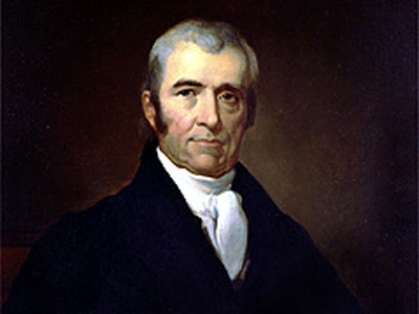
portrait by Henry Inman
I fear...that those have truth on their side who say that man is incapable of governing himself.
Founder, legal theorist, chief justices of the U.S. Supreme
Court
Chief
Justice John Marshall, appointed to the high court by John Adams in
the in final days of his presidency, was probably the most
important of all the Founders of the American republic, and
certainly the most under reported in the 'national narrative' about
the country's founding. Click here for more on John Marshall
John Marshall was the first of fifteen children born to his parents
on the frontier of Fauquier County, Virginia. He inherited
his lanky frame and vigorous constitution from his father, and his
droll wit and good nature from his mother. He served with
Washington's army in War of Independence, and quickly distinguished
himself as an extraordinary legal mind. Daniel Webster one
described him as having a legal intelligence that was as faultless
as his moral compass. "I have never seen a man of whose
intellect I had a higher opinion."
Over the
course of his thirty-four years as chief justice, Marshall wrote
dozens of landmark opinions that continue to guide the ship of
state and protect civil rights and liberties of individual
citizens. Of these, none have had greater impact on the
American Indians than his opinions in three Indian cases, known as
the Marshall Trilogy. For more on Worester, click here. They
not only laid the foundation for federal Indian law, but, through
their application to the unfinished project of federalism,
initiated a vital realignment of government itself.
Related People
Related Events
Related Flashpoints